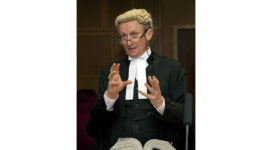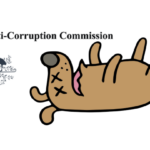Representing the Community: An Interview With Former Senior Crown Prosecutor Mark Tedeschi AM QC

Once described as Australia’s highest flying prosecutor, former NSW Senior Crown Prosecutor Mark Tedeschi QC had a reputation for determinedly bringing justice.
In 1974, Mr Tedeschi’s name was entered into the NSW Supreme Court roll. Three years later, he was called to the NSW Bar. And the former Sydney University law student went on to become the longest serving Crown Prosecutor and Senior Crown Prosecutor in this state’s history.
Of course, Mr Tedeschi didn’t always have a reputation that preceded him into the courtroom. He recalls an incident early on, when he met Sir Lawrence Street in the NSW Bar Association common room and was so overcome with nerves that he knocked the Chief Justice’s tea cup over.
Mr Tedeschi brought his 35 year long career at the Office of the NSW Director of Public Prosecutions to an end in February last year. However, he continues to practice law. And today, he practices as a Senior Counsel in Sydney’s Wardell Chambers.
The Tedeschi hit list
Over his time as Crown Prosecutor, Mr Tedeschi represented the community in some of the most high-profile and controversial cases of the time. Perhaps the most notorious criminal he brought to justice was Ivan Milat, who was convicted over the murder of seven backpackers.
Another notable prosecution was that of Phuong Ngo, the businessman and politician, who was convicted of ordering the 1994 killing of his political rival Australian MP John Newman, which went down as the nation’s first political assassination.
Then there was the 2010 prosecution of Desmond Campbell over pushing his new wife, Janet, off a cliff in the Royal National Park in 2005. The prosecutor successfully argued that the killer had pushed his wife to her death because he needed her money in order to pay off his debts.
And the list goes on. Infamous standover man Arthur “Neddy” Smith, Lin family murderer Robert Xie, the two men who shot Sydney heart surgeon Victor Chang and doubled murderer Bruce Burrell all faced Crown Prosecutor Tedeschi from the dock.
A man of the arts
And Tedeschi is something of a Renaissance man. He’s published three true crime books. These include Eugenia, which is the story of trans man Eugenia Falleni, who was charged over the 1917 murder of his wife, and Kidnapped, an account of the nation’s first kidnapping of a child for ransom.
The former Senior Crown Prosecutor is also a well-known photographer, who’s held fourteen solo exhibitions. His images are included in the collections of the Art Gallery of NSW, the Museum of Sydney, the Justice and Police Museum and the State Library of NSW.
Sydney Criminal Lawyers spoke to Mark Tedeschi QC about his appreciation of the Australian justice system, the lack of ethnic diversity in the judiciary, and his pursuits in the legal field post-prosecution.
Firstly, Mr Tedeschi, you represented the community in some of the most complex cases of the time. Overall, what would you say dealing close up with some of the darkest aspects of our society has taught you?
It’s taught me that ordinary people can sometimes do extraordinary things in extraordinary situations. It also gave me a healthy respect for our criminal justice system. It’s not perfect, but it is one of the best in the world. And I’m a great fan of the jury system.
Of all the cases that you prosecuted over your time, which sticks out to you the most?
The most important criminal trial is always the one that I am doing at that particular time. When you focus on a trial, it’s the most important trial of all.
As a Crown Prosecutor, I was representing the community. As a defence barrister, I’m representing the interests of an accused person. And at that particular time, it’s the most important thing in the world.
I don’t think you can pick and choose between cases, because for the people that are involved in a particular case that you’re doing, it’s of the utmost importance.
Your career as a prosecutor was not without controversy. Following the successful prosecutions of Tim Anderson over the 1978 Hilton bombing and Gordon Wood over the murder of Caroline Byrne, members of the judiciary stated on appeal that your cases had relied upon inferences and suggestions.
Looking back, how do you respond to those criticisms?
As a professional lawyer, I’m obliged to accept those criticisms.
In December 2017, you came under further scrutiny over an email to state prosecutors, in which you asserted that some were making unwarranted concessions to the defence. And you explained that the role of a prosecutor is to “act as a contradictor to the version put forward by an accused”.
How do you sit with these comments two years later?
At the time, I was concerned about some individual cases that had been brought to my attention, although, my remarks were general remarks that weren’t addressed to any particular people or cases.
My concerns were valid, and I acknowledged immediately that Crown Prosecutors, as barristers, have a duty to present the case in the way that they consider to be best.
It’s not a completely unfettered discretion that Crown Prosecutors have. They are subject to the guidelines of the DPP. And when I sent that email, I was addressing concerns that not only I had, but other people had as well.
You’re also the author of three true crime books, one of which is 2016’s Murder at Myall Creek, in which you explore the 1838 trial of eleven convicts and former convicts charged with the brutal massacre of 28 Aboriginal men, women and children.
What was it about this case that drew you to it?
It was a remarkable case, because it was the only instance in which justice was done in response to any of the numerous massacres of Aboriginal people that took place during the 19th century and indeed afterwards.
The only reason that justice was done was because of the incredible work of the man who prosecuted the cases, John Hubert Plunkett, who was the Attorney General at the time.
I thought that he deserved to be widely acknowledged in our society as one of the great Australians of the colonial period, as he was virtually unknown.
So, I wanted to bring him to the attention of the public. And I also wanted to bring to attention the incredible injustices that have been done over a very long time to those Aboriginal communities where massacres occurred all over Australia.
The relationship between the justice system and Aboriginal people is one that has been problematic, to say the least. From your time working in the system, how would you sum up this relationship?
It’s been widely acknowledged that Aboriginal people’s representation in the justice system and in custody is much higher than it should be. And there are many reasons for that.
A lot of people have acknowledged that the disadvantage suffered by Indigenous people has a lot to do with the destruction of their culture, and with the attempted genocide that occurred for more than a hundred years perpetrated by white colonial society.
We should recognise that Indigenous people today are the inheritors of that attempted genocide and the attempted destruction of their culture, that it continues to have an effect today.
Principal of Sydney Criminal Lawyers Ugur Nedim has been raising the subject of ethnic diversity in the NSW judiciary. A recent article we ran reveals that an overwhelming majority of magistrates continue to be Anglo Australians.
Mr Tedeschi, what’s your opinion on the lack of diversity in the judiciary?
There has been a concerted move for some decades to increase the representation of women in the judiciary throughout Australia, including NSW.
However, there has been much less emphasis on increasing the representation of different ethnic communities in the judiciary. One should remember that a significant number of lawyers, particularly solicitors currently practising, are members of those ethnic communities, but they are not adequately represented in the judiciary.
So, there needs to be more of a recognition of the need to increase representation of ethnic communities on the judiciary.
In your opinion, does having a judiciary that doesn’t represent the ethnic makeup of the legal profession, as well as the wider community, have an impact?
It’s a question of fairness and equity. This is particularly important in the Local Court, because that’s the people’s court.
And lastly, you now hold the position of a Senior Counsel practising at Wardell Chambers. So, as you’re no longer the prosecution, what sort of work are you pursuing?
I’m still doing criminal law. I’m mainly doing defence work, which I really enjoy. I’ve also done an extensive inquiry for the NSW Education Department. And I’m doing some important work for the NSW Crown Solicitor’s Office, which I very much enjoy.
So, I’m doing a variety of legal work, and I’m relishing my time at the private bar.







